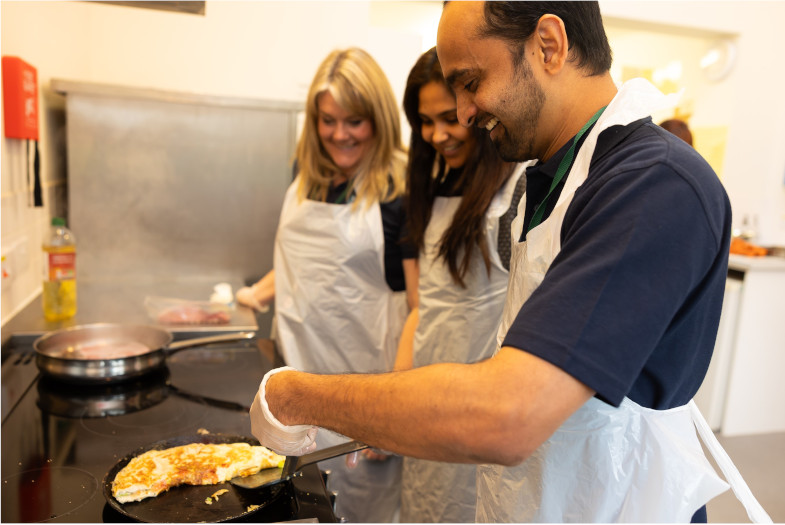Milk before of after? Walfinch carers are cooking to suit clients
How do you like your eggs? That could be one of the questions that carers from Walfinch home care in Oxfordshire will be asking clients more often as the care team focuses on preparing food just the way their clients like it.

“We think our care clients should have their tea brewed and their gravy made to their own tastes, so we have started cookery lessons for our care team to ensure they can make meals to suit each client.”
Hannah Tomlin, Senior Carer and Events Co-ordinator.
Kam Gill, Walfinch Oxford Managing Director, says: “Our carers offer to make proper hot meals for clients, unlike some other services which only offer sandwiches or soups. All our carers can cook, but now we have started sponsoring carers to join our team from abroad, we felt it was time to offer anyone who wants it the chance to find out about traditional British food and the finer skills involved in preparing it.”
Hannah says: “The classes start with a quiz to find out what carers need to know, asking questions such as, 'Which foods would you traditionally serve with gravy?', and, 'What are the different ways you can serve eggs?'. We also stress the importance of asking clients how they would like their food cooked.”
The practical sessions, based around the needs of carers and their clients, are already winning over clients. One who is quite particular about the way his food is prepared, said that the classes had been beneficial and his food had improved as a result.
“I bring along foods that are traditional to the UK, such as crumpets, English muffins and English mustard, which are not used in some other countries. We also explain the uses of fresh and powdered milk (which is commonly used in hotter climates) and the difference between ham and bacon. Both may be similar but it's essential for safety that bacon is cooked. Of course we also explore the vital British art of making tea and coffee to suit each person's taste.
“The group sessions are great fun. We all learn from each other, and some carers are now using their new skills at home as well as at work,” says Hannah.
All carers learn about food hygiene in their initial training, but Kam says: “Practical training to suit the needs of carers and their clients makes a real difference. We want all our clients to enjoy their food, so all our new carers will be offered this practical training. Certificates to recognise carers' new skills are in the pipeline, and we may be looking to introduce more advanced cookery classes in the future.”
